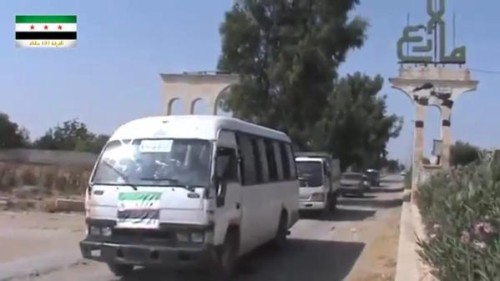PHOTO: Free Syrian Army reinforcements on the move to fight the Islamic State in Aleppo Province, August 2015
Evidence is mounting that Turkey and the US are nearing formal agreement on an area in northern Syria which will be cleared of the Islamic State.
However, it is still unclear if the area along the Turkish border will be protected from attacks by President Assad’s forces.
A Defined Military Plan?
The Turkish Government is promoting the likely agreement through the pages of the daily Hurriyet. In the latest initiative, the newspaper has been given a copy of the memorandum of understanding, to be implemented through a “military operations plan”.
The area is 98 km (61 miles) long, from Mare’ to Jarablus in Aleppo Province, and 40 km (25 miles) deep. It will be occupied by rebels, including the Free Syrian Army; Jabhat al-Nusra, the Islamist faction considered a “terrorist organization” by Washington, has withdrawn most of its fighters from the zone.
US warplanes have already been hitting Islamic State targets, with Turkey granting permission in late July to use Incirik Airbase. American warplanes — including 26 jets from the 480th Fleet, four armed drones, and surveillance aircraft — will also be deployed in three other Turkish provinces.
Under the new plan, Turkish fighter jets will join the airstrikes, and both countries will “back local opposition forces on the ground”, according to Hurriyet.
The newspaper also asserts that Turkey and the US have “verbally agreed” not to permit Kurdish forces to operate west of the Euphrates, effectively drawing a line between the zone and territory taken by the Kurds from the Islamic State from the Euphrates to the Iraqi border. It claims that Washington has told the Syrian Kurdistan Party (PYD) of Ankara’s warning that Turkish forces will challenge any Kurdish militia crossing the line.
The Turkish Government may be enhancing the memorandum of conversation with “spin” through Hurriyet, but support for the agreement came last week in a Hurriyet interview with Brett McGurk, President Obama’s deputy envoy for the anti-Islamic State effort. He said:
We have a team of our own military professionals here in Turkey now that is working with the Turkish military to work out the arrangements and mechanisms we are doing. So the only reason Turkey is not doing airstrikes against Daesh [the Islamic State] is because we are in the final stage of working out the arrangements by which they will do that within our coalition. It’s called an air tasking order. It’s very complicated. It’s military-to-military and those arrangements are being finalized now.
McGurk also optimistically set out an arrangement acceptable to both Turkey and Syria’s Kurds:
Certainly the PYD has a vision for Syria, and we want to make sure that the territorial integrity of Syria is maintained. That’s a bedrock principle of ours that we discuss with the PYD. We are talking to the PYD. Turkey is talking to the PYD. Everybody is talking to each other. But I leave it to the government of Turkey in terms of their formal relationship with the PYD.
I think cooperation [between] groups that are fighting Daesh and that have a vision for Syria maintaining Syria’s territorial integrity and also have a vision for a post-Daesh Syria in which human rights are maintained…is very beneficial….The more cooperation, the better.
The Missing Dimension: Operations Against Assad
However, neither the positive signals from Ankara or from McGurk can cover up a fundamental difference between Turkey and the US.
Is it a “safe zone” — Turkey’s term for an area to be protected from Assad forces as well as the Islamic State — or is it a “clear-and-hold zone”, the US term for operations which are only directed against IS?
If there is support of “local opposition forces on the ground”, as Hurriyet says, will that support be withdrawn if the rebel factions take any action against the Syrian army?
So far, the signals from Washington are that it will restrict any operations to those against the Islamic State. The 54 US-trained rebels who were put into northern Syria — at a cost of $500 million, after months of delays, and only for a few days before they were confronted by Jabhat al-Nusra — were reportedly only cleared for battle on the assurance that they were solely battling IS.
A commander in Division 30, which hosted the US-trained fighters, challenged the restriction in an interview with CNN broadcast this week: “We fight whoever fights us. Are we going to sit still and take it from Assad?”
Turkey may also defy the US condition, embedding its special forces — who could already be in northern Syria — with the rebels.
If so, will the US withdraw its support for the entire project, even if this sets back its effort against the Islamic State?

